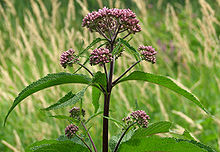Contents
Eutrochium maculatum, the spotted joe-pyeweed,[2] is a North American species of flowering plant in the family Asteraceae. It is widespread through much of the United States and Canada.[3] It is the only species of the genus Eutrochium found west of the Great Plains.[4]
This herbaceous perennial sometimes grows as high as 2 m (6 ft 7 in). Stems are sometimes completely purple, sometimes green with purple spots. One plant can produce numerous rose-purple flower heads in late summer, each head with 8-22 disc flowers but no ray flowers.[5] The specific name maculatum, meaning spotted, refers to the purple spots on the stem.[6][4]
Spotted joe-pyeweed thrives in marshes, rich fens and swamps. It also does well in man-made moist expanses such as ditches, seepage areas and wet fields. Above all else the plant flourishes in the non-shaded environments that are also abundant in wetlands.[7][8]
It is a larval host to the Clymene moth, the eupatorium borer moth, the ruby tiger moth, and the three-lined flower moth.[9] The plant also attracts butterflies and honeybees.[10][11]
Varieties
The following varieties are known:[1][8]
- Eutrochium maculatum var. bruneri (A. Gray) E. E. Lamont - western Canada (British Columbia to Saskatchewan), western USA (Minnesota west to Idaho, south to Arizona + New Mexico)
- Eutrochium maculatum var. foliosum (Fernald) E. E. Lamont - eastern Canada (Newfoundland to Ontario), northern USA (Maine to Minnesota)
- Eutrochium maculatum var. maculatum - eastern Canada (Newfoundland to Ontario), eastern USA (Maine to Minnesota, south to northern Georgia)
Cultivars
The following cultivars are recipients of the Royal Horticultural Society's Award of Garden Merit (listed under the synonym Eupatorium maculatum):-
- (Atropurpureum Group) 'Orchard Dene' [12]
- (Atropurpureum Group) 'Purple Bush' [13]
- (Atropurpureum Group) 'Riesenschirm' [14]

References
- ^ a b "Eutrochium maculatum (L.) E.E.Lamont". The Global Compositae Checklist (GCC) – via The Plant List. Note that this website has been superseded by World Flora Online
- ^ "Eutrochium maculatum". Germplasm Resources Information Network. Agricultural Research Service, United States Department of Agriculture. Retrieved 14 January 2018.
- ^ Eutrochium maculatum, Natural Resources Canada
- ^ a b "Eutrochium maculatum". County-level distribution map from the North American Plant Atlas (NAPA). Biota of North America Program (BONAP). 2014.
- ^ RHS A-Z encyclopedia of garden plants. United Kingdom: Dorling Kindersley. 2008. p. 1136. ISBN 978-1405332965.
- ^ Dickinson, T.; Metsger, D.; Bull, J.; & Dickinson, R. (2004) ROM Field Guide to Wildflowers of Ontario. Toronto:Royal Ontario Museum, p. 164.
- ^ "Eutrochium maculatum var. maculatum". New York Flora Association. 2005. Retrieved 2008-09-24.[permanent dead link]
- ^ a b Lamont, Eric E. (2006). "Eutrochium maculatum". In Flora of North America Editorial Committee (ed.). Flora of North America North of Mexico (FNA). Vol. 21. New York and Oxford: Oxford University Press – via eFloras.org, Missouri Botanical Garden, St. Louis, MO & Harvard University Herbaria, Cambridge, MA.
- ^ The Xerces Society (2016), Gardening for Butterflies: How You Can Attract and Protect Beautiful, Beneficial Insects, Timber Press.
- ^ "Eutrochium maculatum - Plant Finder". www.missouribotanicalgarden.org. Retrieved 2021-11-30.
- ^ "Eutrochium maculatum (Joe-Pye-weed, Queen of the Meadow, Spotted Joe-pye-weed, Spotted Trumpet Weed) | North Carolina Extension Gardener Plant Toolbox". plants.ces.ncsu.edu. Retrieved 2021-11-30.
- ^ "Eupatorium maculatum (Atropurpureum Group) 'Orchard Dene'". RHS. Retrieved 23 June 2020.
- ^ "Eupatorium (Atropurpureum Group) 'Purple Bush'". RHS. Retrieved 23 June 2020.
- ^ "Eupatorium maculatum (Atroput]rpureum Group) 'Riesenschirm'". RHS. Retrieved 23 June 2020.
![]() Media related to Eutrochium maculatum at Wikimedia Commons
Media related to Eutrochium maculatum at Wikimedia Commons

